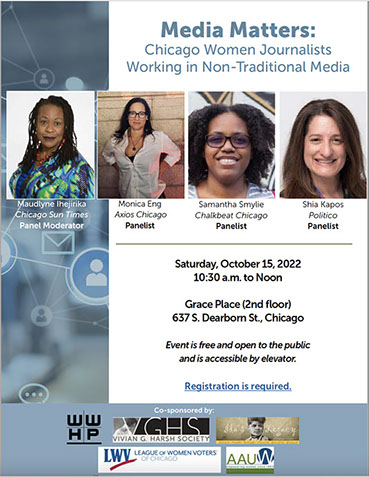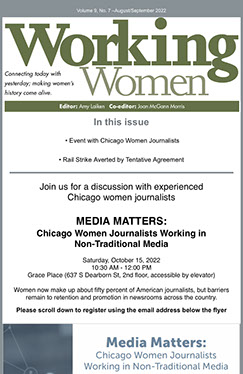Working Womenʼs History Project
Connecting Today with Yesterday
Making Women's History Come Alive



Providing a platform for women leaders in Chicago...
Researching women’s stories and collecting oral histories...
Exploring current issues affecting working women...
Vision
WWHP’s vision is to have a society in which women’s contributions are known and valued and inspire young women to continue their work.
To learn about WWHP’s mission and history, click here.

Please preregister with your name, email, and number of guests,
sending the information to amywwhp@gmail.com
PUBLIC TRANSPORTATION:
https://www.transitchicago.com/planatrip/
PARKING:
· https://www.spotangels.com/chicago/grace-episcopal-church-parking
·
https://www.park1chicago.com/parking-location/601-south-dearborn/
Working Women's Quick History













Hannah Shapiro
In September of 1910, Hannah Shapiro went to her supervisor at Hart, Shaffner and Marx in Chicago to complain about a pay cut. It wasn't just her pay that was being reduced. All the seamstresses had been hit. And it was only a loss of one quarter of a penny per pair of pants, after all. So what was the big deal? The supervisor said nothing could be done.
With permission of the University of Chicago Press.
Mother Jones
Mary Harris "Mother" Jones (1837[1][2] – 30 November 1930) was an Irish-born American schoolteacher and dressmaker who became a prominent organized labor representative and community organizer. She helped coordinate major strikes and cofounded the Industrial Workers of the World.
Dolores Huerta
Dolores Clara Fernandez was born on April 10, 1930 in Dawson, a small mining town in the mountains of northern New Mexico. Her father Juan Ferånández, a farm worker and miner by trade, was a union activist who ran for political office and won a seat in the New Mexico legislature in 1938.
Lucy Parsons
For almost 70 years, Lucy Parsons fought for the rights of the poor and disenfranchised in the face of an increasingly oppressive industrial economic system. Lucy's radical activism challenged the racist and sexist sentiment in a time when even radical Americans believed that a woman's place was in the home.
Agnes Nestor
Agnes Nestor’s mother was a textile mill worker. Her father was a machinist and a one-time member of the Knights of Labor who became a city alderman in Grand Rapids, Michigan. The family migrated to Chicago during the depression of the 1890s, and the teenage Agnes went to work in a glove factory. The sixty-hour work weeks exhausted her.
Vicky Starr
“Stella Nowicki” was the assumed name of Vicki Starr, an activist who participated in the campaign to organize unions in the meatpacking factories of Chicago.
Maria Mangual
A native of Texas, María came to Chicago to further her studies, and immediately became an active advocate for the city's Latino community.
Rev. Addie L. Wyatt
Addie L. Wyatt was a leader in the United States Labor movement, and a civil rights activist. Wyatt is known for being the first African-American woman elected international vice president of a major labor union, the Amalgamated Meat Cutters Union.
Olga M. Madar
Olga Madar graduated from Detroit Northeastern High School in 1933. After graduation she was hired at the Chrysler Kercheval plant on the basis of her ability as an outstanding softball player. As she worked in factories to earn her way through Michigan Normal College (now Eastern Michigan University), she became aware of sex discrimination in employment.
Joyce D. Miller
Joyce D. Miller, an influential advocate for women who believed that equality for them in the workplace could be best achieved through labor unions, and who championed that cause when she broke into the male-dominated leadership of the A.F.L.-C.I.O.
Wendy Pollack
Wendy Pollack is the founder and director of the Women's Law and Policy Initiative at the Shriver Center. She has worked extensively on public benefits and work supports, workforce and economic development, education, employment, family law, violence against women and girls, gender equity in schools, and other issues, on the local, state, and federal level.
Ida B. Wells
Ida Bell Wells (July 16, 1862 to March 25, 1931), better known as Ida B. Wells, was an African-American journalist, abolitionist and feminist who led an anti-lynching crusade in the United States in the 1890s. She went on to found and become integral in groups striving for African-American justice.
Karen Lewis
Karen GJ Lewis was elected president of the 30,000 member Chicago Teachers Union(CTU) on June 11, 2010, and re-elected to a second term in May 2012 by nearly 80 percent of the CTU’s rank and file.
1 - 13
«
»
Each year WWHP will feature a different group
of historical and living women.
© 2018—Working Women's History Project

